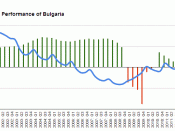Recent evidence has shown that Australia will enter into technical recession in the near future, due to the myriad of global economies also experiencing negative growth. The effect of AustraliaÃÂs strong economic ties to such countries was noted by Prime Minister Kevin Rudd, who conceded on April 20, 2009, that ÃÂit is inevitable that Australia will be dragged into recession.ÃÂ Providing credence to such predictions are indicators in the Australian economy, including statistics of Gross Domestic Product (GDP), building approvals, consumer sentiment, new car sales, unemployment and inflation. Analysis of these indicators shows the weakened position of the economy while suggesting that1 recession in Australia is unavoidable.
Confirming the current state of the Australian economy are co-incident indicators, most significantly GDP and its rate of growth. GDP has been levelling off since early 2007 while the most recent December quarter saw a turning point with negative growth of 0.1%.
Though this figure is not as severe as similar statistics in other nations, it does show that Australia is poised to enter into a second consecutive negative quarter and with it technical recession.
Though it is a lagging indicator, countercyclical unemployment levels give a good idea as to the state of the economy. April figures show that unemployment has risen to 5.5%. This indicates that firms have been slowing production in accordance with the stock adjustment principle. A part of this decline in production that these figures suggest is a reduction in business investment, further decreasing aggregate demand in the Australian economy. Furthermore, the increase in jobless people will lead to a notable fall in consumer spending, resulting from the reduction in income of those who are released from work. Because it negatively influences two major components of the economy, consumption and investment, rising unemployment supports the theory that recession...


